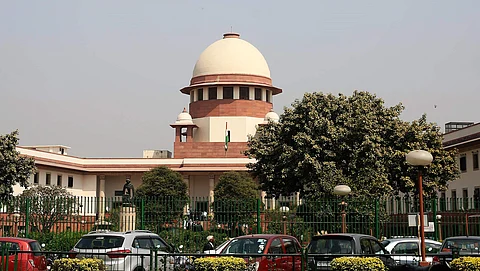

NEW DELHI: Hindu body 'Nirmohi Akahara' is "unnecessarily" opposing the plea of deity 'Ram Lalla' for the title of disputed Ramjanam Bhoomi-Babri Masjid land as both the parties will "stand" or "fall" together, the Supreme Court said Monday.
A 5-judge Constitution bench, headed by Chief Jusrtice Ranjan Gogoi, was critical of the submission of 'Akhara' that being the 'shebait' (devotee), only its lawsuit was maintainable and the case filed by deity 'Ram Lalla Virajman', through next friend Deoki Nandan Agrawal, should not be allowed.
"There is no conflict between your (Akahara's) suit and the suit filed by plaintiff number 1 (Ram Lalla)... Even if the suit of plaintiff (deity and others) is allowed, your right as 'shebait' stands," the bench said while hearing the arguments on the 12th day of the decades-old, politically sensitive case.
"You (Akahara) can claim your 'shebait' right independently. Unnecessarily, you are entering into the conflicting territory you need not go to. It is for Sunni Waqf Board to do that," said the bench, comprising Justices S A Bobde, D Y Chandrachud, Ashok Bhushan and S A Nazeer.
The bench asked senior advocate Sushil Jain, appearing for 'Nirmohi Akahara', that if the lawsuit of the deity was disallowed then for whom will the Akahara be 'shebait' of.
"You (Akhara) stand together and you will fall together. Your argument is that Deoki Nandan Agrwal (who had filed the lawsuit on behalf of the deity as the next friend) had no right to file the suit.
"You (Akhara) cannot be the 'shebait' of the mosque," the bench quipped, adding, "If your suit succeeds, it will be adverse to the deity."
Jain, however, said the 'Akahara' was not saying anything against the deity and moreover, the law is now well settled that the deity need not be a party in all the lawsuits and can be represented through 'shebait'.
"A shebait can maintain the suit on behalf of the deity in its own name and need not implead the deity as a party," the senior lawyer said.
The bench asked Jain to apprise it of the view of 'Akahara' on Tuesday as to whether it was still seeking dismissal of the lawsuit filed by the deity and others.
Referring to judgements, Jain said that though an idol is certainly a "juristic person", it is permanently "linked" with the 'shebait' which can institute and maintain the lawsuits.
The bench said if a third party takes possession of the land of the deity then the 'shebait' may institute the lawsuit, but if there was a "vital interest" was involved, then the deity itself can initiate the lawsuits.
Jain said the deity was not required to be made the party as the 'shebait' can do the needful.
The 'shebait' is ousted only when it is proved that it was acting against the interest of the deity and here, the Akhara is "claiming relief" for 'Ram Lalla' and there was "no conflict of interest".
At the outset, Jain referred to the High Court judgement in the Ayodhya case and the testimonies of several witnesses to highlight that the disputed site was in its possession and Muslims did not offer 'namaz' there since 1934.
So far as my 'shebait' rights are concerned, it was not disputed by any party and has been accepted by all Hindu parties, he said.
The bench asked Jain as to what the Akhara was seeking if it was saying that it was not seeking ownership of the site.
"I want to worship, the worship has to be performed by me. Only the 'shebait' can maintain the suit. I am not interested in money and offerings only. This is my right to maintain the place," the lawyer replied.
The bench asked the Hindu body to show the documents and confine its arguments on its right as 'shebait'.
The lawyer also referred to the land records of 1931 and said that the disputed place was referred to as 'bina lagan ki bhoomi' (area without rent) and the Akahara was in possession of the property when the receiver took it away in 1950.
"But the fact is that the Receiver did not mention the fact that he took the possession of the Ram Janmbhoomi from us," the lawyer said.
The counsel for 'Nirmohi Akahara' would continue advancing submissions on Tuesday.
Earlier, the court had told the Akhara its claim over the disputed area as 'shebait' "can never be adverse to the deity".
The Allahabad High Court, in its judgment of 2010 on four civil lawsuits, had partitioned the 2.77-acre disputed land equally among the three parties Sunni Waqf Board, Nirmohi Akhara and Ram Lalla.
Fourteen appeals have been filed in the Supreme Court against the 2010 Allahabad High Court judgment.
Babri Masjid was demolished by right-wing activists on December 6, 1992 in Ayodhya, leading to the protracted legal battle.